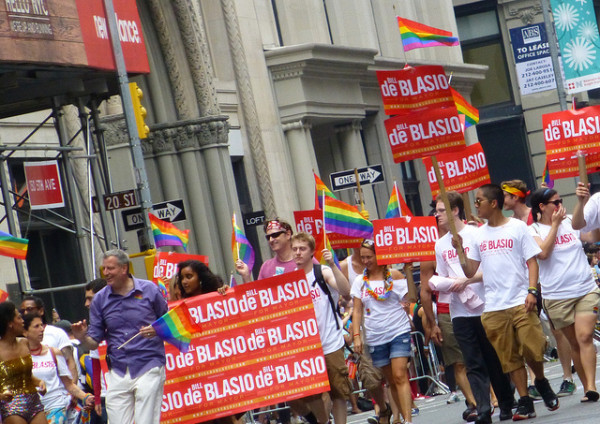 [clear] Arturo-Ignacio Sánchez
[clear] Arturo-Ignacio Sánchez
Originally published in QueensLatino.com
The electoral phenomenon is a perfect storm. De Blasio’s neo-populist campaign message, of a tale of two cities, resonated with New Yorkers. Massive and growing economic inequalities – which are fracturing New York’s social fabric – have emerged as a political liability and triggered a call for fundamental change. Nonetheless, a crucial question remains: As mayor, how will Bill de Blasio generate and mobilize the necessary political support to successfully confront the corporate dominated regime that favors the few over the many?
New York is a city of immigrants. Our newest New Yorkers are the proverbial many. Immigrants now make up the bulk of the city’s entrepreneurs, laboring majorities, and future voters. These massive changes have restructured neighborhood economies and weakened the city’s traditional political constituencies. In the wake of these shifts, growing immigrant constituencies are emerging as vocal political and civic agents. New political realities require new political strategies. As such, any viable attempt at crafting a post-electoral governing coalition – that addresses regime change – must include immigrants as full members with voice and vote.
Assembling a progressive governing coalition with the political leverage to implement regime change is not easy and will require a creative sense of the possible. New York’s urban growth machine – with its formidable and long-standing economic and political interests – will pose a significant challenge. During the past twenty-years, the Giuliani/Bloomberg finance and real estate driven growth regime has solidified its position in Manhattan, and expanded and deepened its presence in the outer borough immigrant neighborhoods.
New York’s immigrant neighborhoods contain what professors Peter Marcuse and Ronald van Kemp call “soft locations.” These locations include sites that were overlooked by corporate real estate interests, are perceived as politically vulnerable, and are therefore susceptible to speculative investments. Examples of “soft” sites include waterfronts, public park land, manufacturing areas, brownfields (former industrial sites that are polluted), and assorted public spaces.
The immigrant neighborhoods of Corona, Elmhurst, and Flushing in northwestern Queens are “soft locations” for corporate real estate development and gentrification. These neighborhoods are threatened by the Robert Moses like real estate project of Willets Point, the privatization and massive construction of tourist-based stadiums in Flushing Meadows Corona Park, and the proposed establishment of a Business Improvement District along the Roosevelt Avenue commercial corridor.
The incursion of this speculative real estate driven growth will open these neighborhoods to national chain stores that will eventually decimate small immigrant businesses, undermine fragile immigrant labor markets, dramatically increase land values, and encourage corporate driven gentrification that displaces immigrants, seniors, and folks on fixed incomes. Although these real estate projects have secured the political support of local Latino elected officials and other members of the local growth machine, they have also experienced a significant push-back by local immigrant businesses, workers, and community and civic activists.
“Soft” immigrant neighborhoods are strategic sites for organizing a governing coalition with the bottom-up leverage to unravel the growth regime in the outer boroughs. This prospective coalition would include small business owners, immigrant workers, second-generation immigrant youths, neighborhood activists, and progressive elected officials and labor unions. In short, a reform-based governing coalition requires crafting a novel bottom-up socio-political architecture.
The outer borough immigrants-based approach is a viable and innovative political project. It represents the hopes and regenerative possibilities of a new New York. And in a pragmatic sense, it builds upon changing demographics, emerging constituencies, new economic realities, and the social justice invoked by the tale of two cities narrative. In the words of the American bard, Bob Dylan: “You don’t need a weatherman to know which way the wind is blowing.”
Arturo Ignacio Sánchez, Ph.D. is chairperson of the Newest New Yorkers Committee of Community Board 3, Queens. He has taught contemporary immigration, entrepreneurship, and urban planning at Barnard College, Columbia University, Cornell University, and Pratt Institute.









